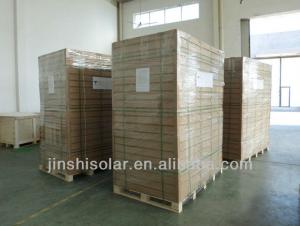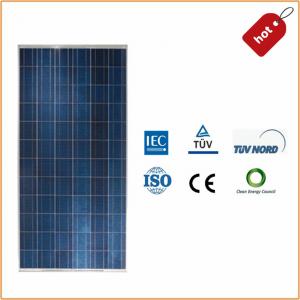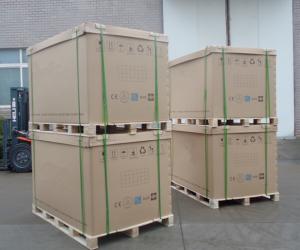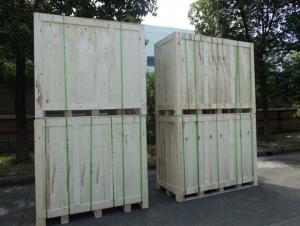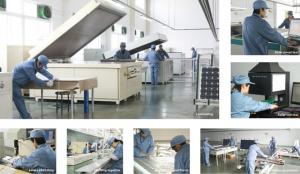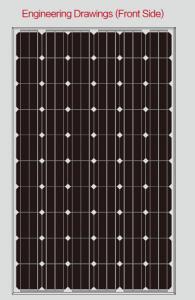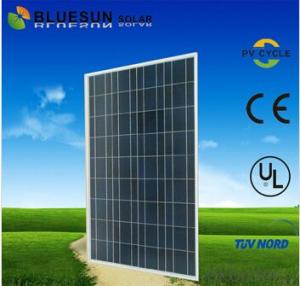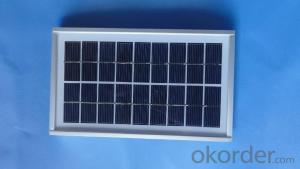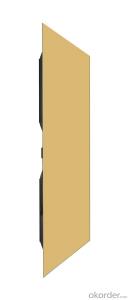300w Solar Panel with TUV and UL Certification in China
- Loading Port:
- Ningbo
- Payment Terms:
- TT or LC
- Min Order Qty:
- -
- Supply Capability:
- 5000 watt/month
OKorder Service Pledge
OKorder Financial Service
You Might Also Like
Solar Panel 300w with Good Quality and Warranty
Mechanical Characteristics
Cell Type | Poly Crystalline 156×156mm(6 inch) |
No. of Cells | 72(6×12) |
Dimension | 1950×992×50mm |
Weight | 23kg |
Component element
Front Glass | 3.2mm, High Transmission, Low Iron, Tempered Glass |
Frame | Anodized Aluminum Alloy Type 6063-T5 |
Junction Box | IP 65 Rated (Black) |
Output Cables | TUV 1×4mm2, length:900mm |
Connector | MC4(UV resistance and self-locking/IP67) |
Encapsulation Material | EVA(0.50±0.03mm thickness) |
Back Foil | White TPT(0.32±0.03mm thickness) |
Fixing Adhesive | Silicone Sealant(White) |
Specifications
Module Type | 270P | 280P | 290P | 300P |
Maximum Power at STC (Pmax) | 270Wp | 280Wp | 290Wp | 300Wp |
Maximum Power Voltage (Vmp) | 36.21V | 36.38V | 36.50V | 36.60V |
Maximum Power Current (Imp) | 7.46A | 7.61A | 7.95A | 8.20A |
Open-circuit Voltage (Voc) | 43.50V | 43.70V | 43.95V | 44.30V |
Short-circuit Current (Isc) | 7.98A | 8.24A | 8.50A | 8.77A |
Cell Efficiency (%) | 15.7% | 16.3% | 16.9% | 17.2% |
Module Efficiency (%) | 14% | 14.5% | 15.0% | 15.5% |
Operating Temperature( °C ) | -40°C ~+90°C | |||
Maximum System Voltage(V) | DC 1000V(TUV) / DC600V(UL) | |||
Maximum Rated Current Series(A) | 15A | |||
Power Tolerance | 0~+3% | |||
Temperature Coefficients of Pmax | (-0.45±0.05)%/°C | |||
Temperature Coefficients of Voc | (0.05±0.01) %/°C | |||
Temperature Coefficients of Isc | (-0.35±0.02)%/°C | |||
NOTC(°C ) | (47±2)°C | |||
STC: Irradiance 1000W/M2 Module Temperature: 25°C AM=1.5
Warranty
Warranty | 10-year warranty on product material and processing technology |
Industry power output warranty: 90% in 12 years, 80% in 25 years |
Package

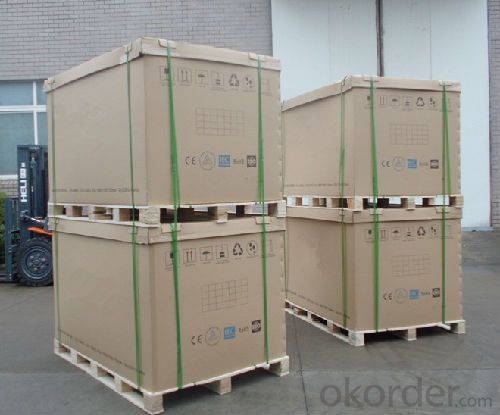
FAQ
I. Will you focus on the safety of the goods during transportation?
Yes, Safety of the cargo is the primary element that we would consider on transportation.
II..How would guarantee the quality will meet the requirements of your clients?
Before shipment, we will have inspection for each batch of goods.
III..What certificates do you have?
IEC,UL,TUV,CSA,etc.
IV..Can you do OEM according to clients’ requirements?
Yes, we have our own brand while we can provide OEM service.
- Q:Do solar panels require a battery backup system?
- No, solar panels do not necessarily require a battery backup system. Solar panels generate electricity from sunlight, but without a battery backup, the excess energy produced during the day is typically fed back into the grid. However, a battery backup system can be useful in areas with frequent power outages or for those who want to store and use the solar energy generated during the night or when the grid is down.
- Q:Due to erratic power cuts in my area I want to make up by using a 30watt solar panel. My decoder is 30watt but my TV is 70W. I need something small. I don't have problem with sound. Just picture.
- Do what we do when power is cut (although we have very reliable power - we loose as much as 2 hours a year), is go Amish. That is go without powered technology. Now, for you, you need more than a solar panel (and likely more than 30W, but that is a start) - you need a battery or set of batteries to store the collected power. 20Ah might do. You need an inverter to power things. For that, likely a 300W will do. For a TV, go shopping, and look at the labels on the back of the TVs. I just bought a 24 TV rated at 40W. If you get a 9 LED TV, it may be likely you can run that directly from battery, for many have separate DC brick supplies. With those, you can make a cable to power it directly from a 2V or so battery, if the supply can make 2 to 5V. Depending on your provider, you may be able to get a mini-decoder which uses a separate brick or wall supply, which means the decoder likely can be directly battery powered. Such a decoder may draw less than 20W.
- Q:Do solar panels require direct sunlight to generate electricity?
- Yes, solar panels do require direct sunlight to generate electricity. While they can still generate some electricity on cloudy days or in indirect sunlight, their efficiency is significantly reduced without direct sunlight.
- Q:Can solar panels be used for heating swimming pools?
- Yes, solar panels can be used for heating swimming pools. Solar thermal panels, also known as solar collectors, are specifically designed to capture and convert sunlight into heat energy, which can be used to warm the water in swimming pools. This method of heating pools is environmentally friendly and cost-effective in the long run, as it relies on free and abundant solar energy.
- Q:I want to know how you can store energy using a solar panel. The energy stored needs to be stored so that a light or laptop charger can plug in to it.
- Solar panel is not a energy storing device, rather it converts light energy to electrical energy and this energy either can directly used to run instruments or can be fed to battery for storing. The working of the solar panel is like the inverse action of a LED, i.e. a LED converts electrical energy in to light where as a solar panel converts light energy in to electrical energy, basically it is a P-N junction diode.
- Q:Can solar panels be installed on a streetlight?
- Yes, solar panels can be installed on a streetlight. This is known as solar street lighting, where solar panels are mounted on top of streetlights to generate electricity from sunlight and power the lights.
- Q:If a solar panel is a .5kW system, what length of time is it putting out that much power? Every hour?
- Solar panels are rated under standard test conditions (STC), a certain amount of light at a certain distance, at a certain temperature, etc. A kW, or kilo watt, is 000 watts. So for the amount of time that the sun meets those conditions, the rate of output is 500 watts. An average location has an average of 5 sun hours a day, the total time that you produce the rated output. Watts is a rate, like miles per hour (mph), how fast it is going. Watt hours, or kilo watt hours (kwh) is a quantity, like miles. So if you drive 50 mph for 5 hours, you went 250 miles (50 mph x 5 hours). If you produce .5kw for 5 hours, you have the potential to produce 7.5kwh a day. Multiply that by 30 days in a month, you get 225kwh a month. In reality you will lose about 30% of the rated power from less than ideal weather, system losses, etc., so it's more like 50kwh a month. You can look at your electric bill to see how many kwh you use a month, maybe around 000kwh, and see what percentage of your usage a system like that can power.
- Q:How much energy can solar panels produce?
- The amount of energy solar panels can produce depends on various factors such as the size and efficiency of the panels, the location and climate, and the amount of sunlight available. On average, a typical residential solar panel system can generate anywhere from 4,000 to 8,000 kilowatt-hours (kWh) of electricity per year. However, larger commercial or utility-scale solar installations can produce significantly more energy, potentially reaching several megawatts of power.
- Q:how much electricity will produce in Kwh by a 000 W solar panel in a sunny tropical area per day (good sunlight at least 0 hour a day)
- 0 kWh
- Q:What is the average size of a solar panel?
- The average size of a solar panel is typically around 65 inches by 39 inches, or approximately 5.4 feet by 3.25 feet. However, the actual size can vary depending on the manufacturer and the specific model of the solar panel.
1. Manufacturer Overview |
|
|---|---|
| Location | |
| Year Established | |
| Annual Output Value | |
| Main Markets | |
| Company Certifications | |
2. Manufacturer Certificates |
|
|---|---|
| a) Certification Name | |
| Range | |
| Reference | |
| Validity Period | |
3. Manufacturer Capability |
|
|---|---|
| a)Trade Capacity | |
| Nearest Port | |
| Export Percentage | |
| No.of Employees in Trade Department | |
| Language Spoken: | |
| b)Factory Information | |
| Factory Size: | |
| No. of Production Lines | |
| Contract Manufacturing | |
| Product Price Range | |
Send your message to us
300w Solar Panel with TUV and UL Certification in China
- Loading Port:
- Ningbo
- Payment Terms:
- TT or LC
- Min Order Qty:
- -
- Supply Capability:
- 5000 watt/month
OKorder Service Pledge
OKorder Financial Service
Similar products
New products
Hot products
Related keywords
